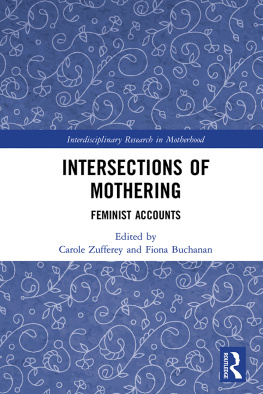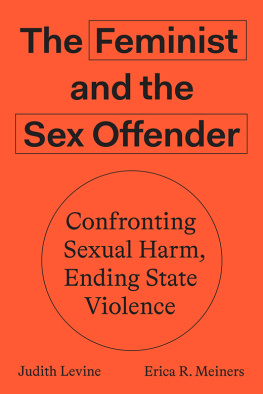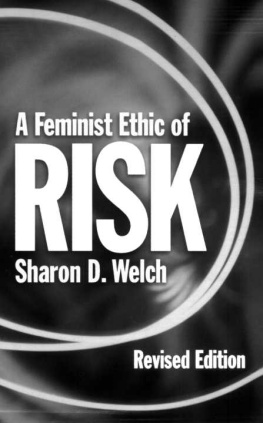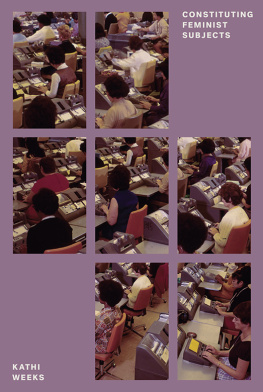Cover art entitled Hybrid Intersectionality (Self-Portrait)
By Alana Boltwood, 2011
Acrylic and paper on canvass
This painting is part of a series of artworks combining the sociological concept of intersectionality with the intersection of sets in mathematics. See the full series at http://meta-geometer.com/other-geometries/intersectionality
Published by
State University of New York Press, Albany
2012 State University of New York
All rights reserved
Printed in the United States of America
No part of this book may be used or reproduced in any manner whatsoever without written permission. No part of this book may be stored in a retrieval system or transmitted in any form or by any means including electronic, electrostatic, magnetic tape, mechanical, photocopying, recording, or otherwise without the prior permission in writing of the publisher.
For information, contact State University of New York Press, Albany, NY
www.sunypress.edu
Production by Diane Ganeles
Marketing by Anne M. Valentine
Library of Congress Cataloging-in-Publication Data
Standing in the intersection : feminist voices, feminist practices in communication studies / edited by Karma R. Chvez and Cindy L. Griffin.
p. cm.
Includes bibliographical references and index.
ISBN 978-1-4384-4490-1 (pbk. : alk. paper) ISBN 978-1-4384-4489-5 (hardcover : alk. paper)
1. Feminism. 2. Feminist theory. 3. WomenCommunication. 4. RhetoricSocial aspects. I. Chvez, Karma R. II. Griffin, Cindy L.
HQ1155.S86 2012
305.42dc23
2012003670
10 9 8 7 6 5 4 3 2 1
Acknowledgments
T his project emerged through our many conversations that transpired during and after coediting a special issue of Women's Studies in Communication on power feminism. Throughout that journey, we felt a need to continue to strengthen conversations in feminism and communication and build upon the excellent work that some, though not many, of our colleagues were doing from an intersectional perspective. In the midst of these conversations we realized the 20th anniversary of a special issue of Women's Studies in Communication (1988), What Distinguishes/Ought to Distinguish Feminist Scholarship in Communication Studies? had arrived. In that issue, feminists, including Lois Self, Karlyn Kohrs Campbell, Celeste Condit, Sonja Foss, Karen Foss, Marlene Fine, Jan Muto, Julia Wood, Marsha Houston, Carole Spitzack, and Kathryn Carter, offered their thoughts regarding the state of feminist scholarship and their visions for where it might be headed. We are grateful to these feminists for initiating that conversation, and we used that question, and their ideas, as our impetus for our brainstorming and thinking about how we might contribute to feminist intersectional scholarship.
We decided to reintroduce that question at two different panels in 2009, one sponsored by the Organization for Research on Women and Communication at the Western States Communication Association Conference and the other sponsored by the Feminist and Women's Studies Division, and also featured as a Five Years Out Spotlight Panel at the National Communication Association Convention. The following scholars took part in those two panels: Bernadette Calafell, Carole Spitzack Daruna, Marlene Fine, Karen Foss, Sonja Foss, Michelle Holling, Jan Muto, and Shanara Reid-Brinkley (WSCA); and Brenda J. Allen, Celeste Condit, Cerise Glenn, Radha Hegde (who was unable to attend at the last minute), Shane Moreman, Sara McKinnon, and Julia Wood (NCA). These panels, the insights and arguments the scholars offered, and our reflection on the question of the state and place of feminist scholarship helped to frame our thinking on the issues in this book, and we are grateful to all the participants for their willingness to share their ideas, question one another, and consider carefully the ways feminist scholarship is linked to intersectional ideas and practices.
At the 2009 NCA Convention, we also held a preconference seminar, and this is where most of the essays in this collection began. We are grateful to the following participants: Janell Bauer, Olga Idriss Davis, Maisha Fields Vogel, Shiv Ganesh, Cerise Glenn, Leslie Hahner, Sara Hayden, Michelle Kelsey (who was unable to attend at the last minute), Sara McKinnon, Lynn O'Brien Hallstein, Denise Oles-Acevedo, T. M. Linda Scholz, Christine Scodari, Danielle Stern, Carly Woods, and Kate Zittlow Rogness. The conversations, questions, agreements, and disagreements offered during that seminar helped us think in new ways about intersectional scholarship and feminisms. We appreciate the honesty of these scholars, their careful work, and their insistence on integrity and innovation in their feminist scholarship.
We also are very appreciative of the helpful feedback we received on our introduction from Marsha Houston, Aimee Carrillo Rowe, and Sara McKinnon. Lester Olson and Shanara Reid-Brinkley pointed us to existing scholarship we had not been aware of, and for that we are very grateful. At SUNY Press, we are thankful that Nancy Ellegate originally agreed to take on this project, and we are incredibly grateful for the amazing work of our editor, Beth Bouloukos, who assumed control of the project and efficiently moved it through this process.
We thank Belle Edson for initially introducing us. Of course, our scholarship is strengthened and nurtured by our partners, Sara McKinnon and Michael Harte, and our numerous, faithful, and entertaining animal companions; for them we are extraordinarily thankful. Finally, to Trouble and Bruiser, it's been a great ride.
Foreword
Difficult Dialogues: Intersectionality as Lived Experience
Marsha Houston
A t a National Communication Association (NCA) meeting during the 1990s, an Asian American woman colleague greeted me warmly and said, Marsha, you figure in a lot of people's mythologies! I've just come from a panel where someone was discussing you. Although the personal reference was a bit disconcertingsince I and not my work was the subject of discussionbecause my colleague and I had known each other a while and her comment was accompanied by an ironic smile, I didn't need to ask who had said what. On more than one occasion, I had asked a question, presented a paper, or provided a response to a panel at the NCA or other communication association meetings that were intended to promote understanding of women's diversity, but that others (particularly white others) interpreted as accusing them of being racist.
For example, in the mid-1980s I attended an NCA Women's Caucus panel on diversity in feminist communication research. All the presenters were white women; among them were lesbian scholars who spoke as insiders about communication and lesbian identities. I wondered why there were no scholars of color speaking as insiders about our communicative lives. When the question and answer period opened, I turned to my mentor and dissertation advisor who was sitting next to me and whispered something like, How can they truly explore diversity when all of them are white? Well, she replied, ask them. I did; and this initiated a conversation that enmeshed me in the mythologies of certain feminist communication scholars for many years.









